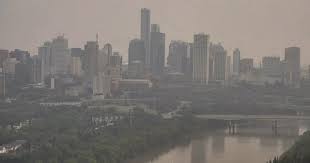Understanding Air Quality in Edmonton: A Current Overview

Introduction: The Importance of Air Quality in Edmonton
Air quality is a pressing issue for urban populations, particularly in cities like Edmonton, Alberta. The quality of the air we breathe has direct implications for public health, environmental sustainability, and quality of life. Recent studies show that poor air quality can lead to respiratory issues, cardiovascular diseases, and can disproportionately affect vulnerable communities. Monitoring air quality is essential not only for immediate public health responses but also for long-term urban planning and environmental policies.
Current Air Quality Trends
As of October 2023, Edmonton has experienced fluctuating air quality levels largely due to seasonal factors and environmental changes. The Air Quality Health Index (AQHI) reported several days of ‘moderate’ to ‘unhealthy for sensitive groups’ air quality, particularly attributed to smoke from wildfires in nearby regions, industrial emissions, and vehicular traffic. During the recent wildfire season, many Alberta communities, including Edmonton, faced increased pollution, raising public health alerts.
The Edmonton Air Quality Monitoring Network provides real-time data on pollutants like particulate matter (PM2.5), nitrogen dioxide (NO2), and ozone (O3). According to the latest reports, particulate matter levels have seen a noticeable increase, prompting health advisories for those with pre-existing health conditions and encouraging the general public to limit outdoor activities during high pollution days.
Health Implications and Measures
Health experts emphasize the importance of understanding air quality readings. Residents are advised to track the AQHI through local government announcements and mobile applications that provide real-time updates. During periods of poor air quality, citizens are encouraged to stay indoors, use air purifiers, and minimize strenuous outdoor activities.
The City of Edmonton is committed to improving air quality through initiatives aimed at reducing greenhouse gas emissions, encouraging public transportation, and enhancing green spaces within urban settings. Community engagement and education are also key components of the city’s strategy to foster a culture of awareness around air quality.
Conclusion: Looking Ahead
As Edmonton continues to navigate the complexities of air quality management, the collaboration between citizens, health officials, and policymakers will be crucial. Ongoing climate change and its resultant impact on the environment suggest that air quality challenges will persist, making it essential for residents to remain informed and proactive. In the coming years, advancements in technology and sustainable urban policies will hopefully lead to significant improvements in air quality, benefiting the health and wellbeing of all Edmontonians.









